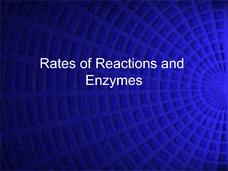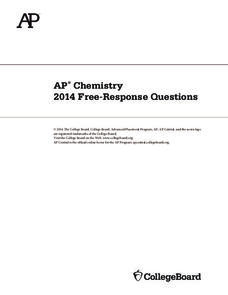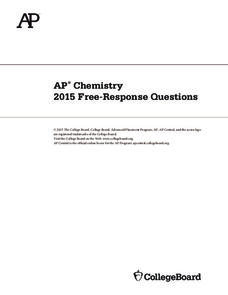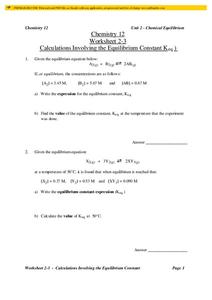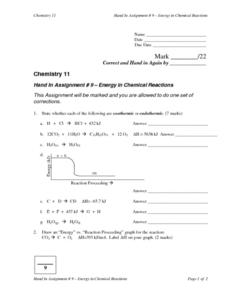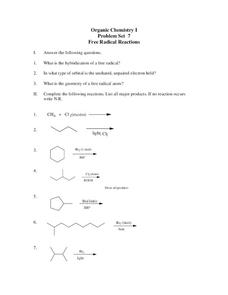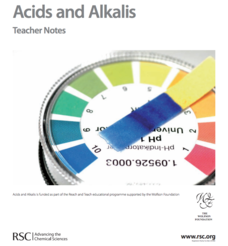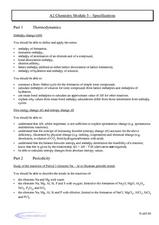Curated OER
Rates of Reactions end Enzymes
Introducing enzymes and the controlling factors of a reaction this slideshow displays the typical rate of reaction graph and labels the main sections. The summaries of ways to measure reaction rates are valuable and the examples of...
College Board
2014 AP® Chemistry Free-Response Questions
More than half of AP Chemistry test takers earn a high enough score to get college credit. Improve that statistic by using past test questions including precipitate, molarity, and chemical equations to prepare for a future exam. The...
College Board
2015 AP® Chemistry Free-Response Questions
More than 80,000 scholars earned college credit for Chemistry with the AP exam in 2015. The College Board released the free-response questions covering topics, including moles, that often confuse scholars. They also released example...
Curated OER
Chemical Equilibrium
In this chemical reactions worksheet, students determine the value of the equilibrium constant and determine if the equilibrium equation given will lead to a reaction. This worksheet has 27 problems to solve.
Curated OER
Energy in Chemical Reactions
In this chemical reaction worksheet, students determine if reactions are exothermic or endothermic. Students define enthalpy and calculate how much heat is released or absorbed during reactions. This worksheet has 1 matching, 1 fill in...
Curated OER
Substances And Chemical Reactions
Students watch and predict chemical reactions when different substances are mixed together. They differentiate between solid, liquid, and gas.
Curated OER
Chemical Reactions and Balancing Equations
Students perform various laboratory activities involving chemical reactions. They write balanced chemical equations for all reactions observed using computer software.
Curated OER
Reaction Rates
In this chemical reactions worksheet, students explain why certain reactions take place slowly or quickly. Students calculate the rate of consumption for given reactions. This worksheet has 14 problems to solve.
Curated OER
Practice Test Chapter 12: Energy Changes in Chemical Reactions
In this chemistry practice test worksheet, students review their knowledge of energy changes in chemical reactions as they answer 17 multiple choice and short answer questions.
Curated OER
Chemical Equilibrium Worksheet
In this chemical equilibrium worksheet, students match the 8 terms on the left with the correct description on the right. They write short answers and fill in the chart for 27 questions.
Curated OER
Keep it Bottled Up: Linear Rates of Pressure Increase
Pupils explore linear functions in this lesson when they collect and analyze data as a chemical reaction proceeds. Learners record pressure versus time data and model the data as a linear function. They also examine the concept of slope...
Curated OER
Physical vs. Chemical Changes and "The Code"
In this chemical and physical change worksheet, learners read about the differences between substances going through physical changes vs. chemical changes. They are given examples of each and evidence to look for in chemical changes....
Curated OER
Another Balancing Equations Sheet
In this reactions worksheet, students balance the reactants and products for the given chemical reactions. This worksheet has 15 problems to solve.
Curated OER
How Can You Tell One Clear Gas From Another?
Fifth graders perform experiments to determine the identity of an unknown gas sample. In this chemistry lesson, 5th graders fill balloons with air, oxygen, hydrogen, and carbon dioxide. They use mass and reactivity to identify the gases.
Curated OER
Free Radical Reactions
In this chemistry worksheet, students look at the diagrams for the chemistry reaction. Then they write down the correct chemical reaction.
Curated OER
Version 001 – Exam 1 – David Laude (53015) 1
A 30-question multiple choice chemistry test challenges takers. Topics touched upon include thermochemistry, equilibrium, behavior of gases, and pH. Problem solving is required in order to answer most of the questions. Other questions...
Royal Society of Chemistry
Acids and Alkalis—Gifted and Talented Chemistry
Looking for a comprehensive plan for teaching acid-base chemistry? Science scholars discover acid-base interactions through a thoughtfully written unit. The resource is divided into paced activities and individual work designed to...
Curated OER
Chemistry in a Bag Demonstration
Middle schoolers experiment in a lab and observe chemical reactions and pH changes. In this experimental lesson plan students participate in a lab then write their observations and fill out a worksheet.
CK-12 Foundation
Hotpack - Coldpack
Chemistry can help athletes and others protect and treat injuries. Use the interactive activity to explore the chemical reactions in instant hot and coldpacks. Learners manipulate the type of salt in the pack and watch the reaction take...
Cornell University
Radical Reactions
The radical reactions of polymers seems abstract to many pupils, but this lesson turns them into a fun building game. Scholars use dice and building pieces to build polymers. Then, they determine the theoretical and experimental weight...
Beyond Benign
Catalysts and Oxygen
Here is an engaging and hands-on lesson plan that allows high school chemists to demonstrate the effects of a catalyst on various chemicals. They garner knowledge of how reactants and products differ from one another, while analyzing the...
Curated OER
Rate and Concentration
Experimental data for a chemical reaction is available in a table. Chemistry cohorts use critical thinking skills to analyze the data and answer questions about reaction rates and reaction order. This worksheet is neatly formatted,...
Curated OER
Chemistry Module 5 - Specifications
While this resource does not provide problems for chemistry learners to solve, it outlines skills that they should have and concepts that they should grasp. Topics include thermodynamics, periodicity, redox equilibria, transition metals,...
Science Geek
Reaction Kinetics
Show your classes the science behind rates of reactions with a presentation that explains factors that affect the rate, activation energies, exothermic and endothermic processes, and the proportionality of the product and reactant rates.


